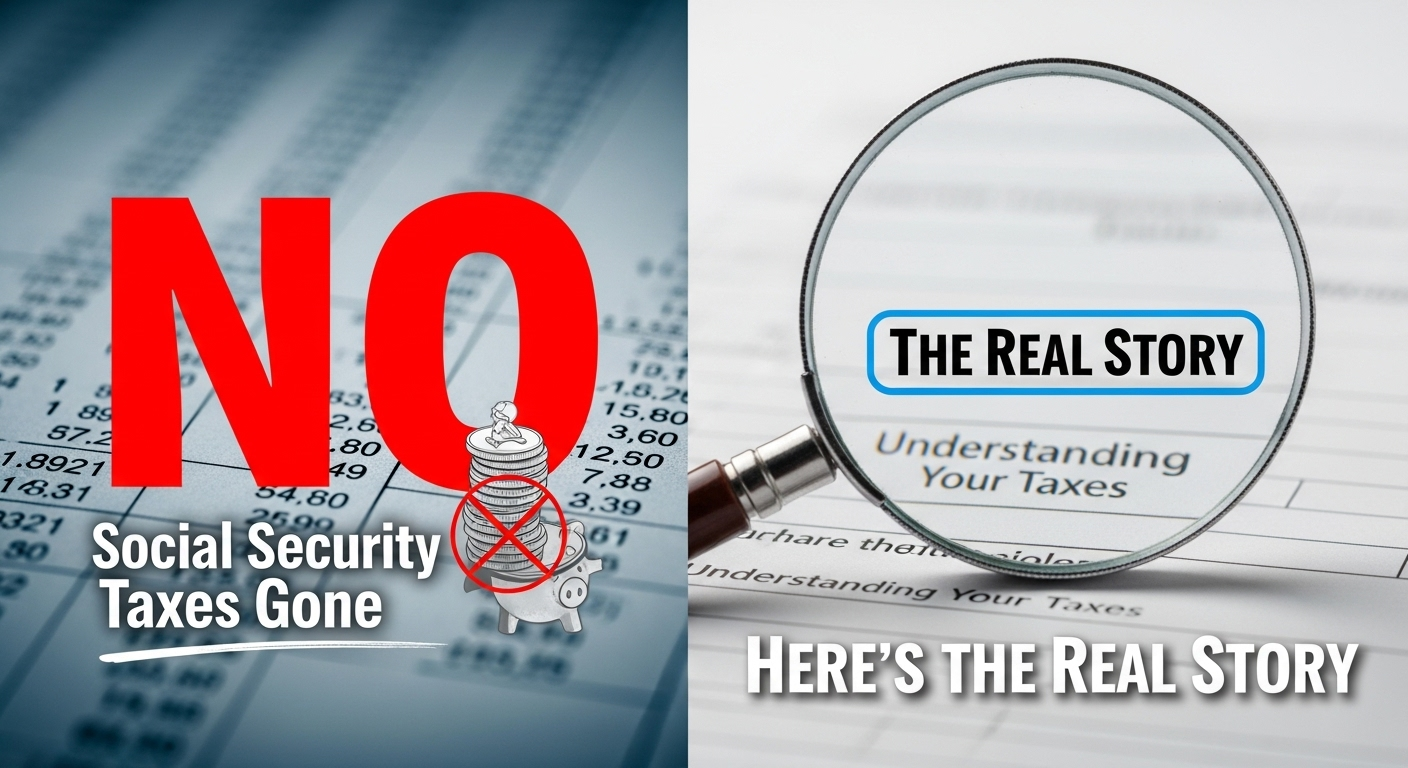For months now, retirees across the country have been celebrating—or at least breathing a little easier—thinking that their Social Security checks would finally be free of federal taxes. It’s a nice idea, right?
Too bad it’s not true.
Despite what some emails, headlines, and social media posts might have told you, Social Security benefits are still being taxed. And not just a little. Millions of seniors will still owe taxes on up to 85% of their benefits next year.
If that comes as a surprise, you’re not alone.
The confusion started shortly after the passage of a major piece of legislation earlier this summer—officially called the One Big Beautiful Bill—which included a new provision for older taxpayers. Supporters called it a game-changer. The Social Security Administration (SSA) even sent out an email claiming nearly 90% of seniors would no longer pay federal taxes on their benefits.
But here’s the truth: that email was quietly edited days later, and tax professionals have been scrambling ever since to clear up the mess.
“It’s frustrating,” said Adam Marowitz, a Florida-based tax expert. “We’ve got seniors walking into our office saying, ‘I thought we didn’t have to pay taxes anymore!’ and we have to break it to them that, yes, you do.”
So, What Did the New Law Actually Do?
The law introduced a new tax break called the Senior Bonus Deduction—a $6,000 deduction meant to help older Americans keep more of their money.
But here’s the catch: this deduction is temporary, limited, and doesn’t eliminate Social Security taxes at all.
Let’s break it down:
- It’s only for people age 65 and older
- It starts in 2025 and ends after 2028
- It phases out for individuals earning more than $75,000 and couples earning over $150,000
- Married couples filing separately don’t qualify at all
- And it applies to all taxable income, not just Social Security
That last part is key. Even with the $6,000 deduction, many retirees will still owe taxes on a large chunk of their benefits. Especially if they also have income from part-time jobs, pensions, or retirement savings.
Let’s Look at a Real Example
Meet Linda, a 68-year-old widow from Ohio. She gets $50,000 a year in Social Security and earns another $30,000 from a part-time job and small 401(k) withdrawals.
Even with the new deduction, Linda will still have to pay tax on 85% of her Social Security benefits—because her total income is too high to avoid it under the old rules from 1984. (More on that in a moment.)
The $6,000 deduction will reduce her taxable income slightly, saving her about $720—not nothing, but not life-changing either.
“People are acting like this is a massive tax break,” says Marowitz. “But for most of our clients, it’s a small discount—not a free pass.”
Why Are Social Security Benefits Taxed Anyway?
This might come as a shock to some, but Social Security benefits have been taxable for over 40 years.
Back in 1984, Congress passed a law to shore up the struggling Social Security trust fund. Under that law, individuals with “combined income” over $25,000 and couples over $32,000 started paying taxes on a portion of their benefits.
That “combined income” formula includes your adjusted gross income (like wages, dividends, and IRA withdrawals), plus any tax-exempt interest, plus half of your Social Security benefits.
The real kicker? Those income thresholds have never been adjusted for inflation. In today’s dollars, $25,000 from 1984 would be worth around $75,000—but the tax brackets haven’t changed.
So as the cost of living rises and more seniors work part-time or tap retirement savings, more and more retirees fall into the taxable zone.
About That “90% Tax-Free” Claim…
In July, the Social Security Administration sent out an email that many people interpreted as saying almost all seniors would be free from paying taxes on their benefits.
Here’s what it said: “Nearly 90% of Social Security beneficiaries will no longer pay federal income tax on their benefits under the new law.”
Sounds great, right?
The problem? It’s just not true. The SSA later changed the statement online without explanation.
Tax analysts across the country quickly pushed back. “That number isn’t even close to accurate,” said Howard Blechman of the Tax Policy Center. “At best, maybe half of Social Security recipients will see some sort of reduction. And most of them will still owe something.”
Some tax experts believe the miscommunication may have been politically motivated, an attempt to make the law seem more generous than it really is.
Why Can’t We Just Eliminate the Tax Altogether?
Believe it or not, there are legal reasons Congress can’t simply wipe out the Social Security tax through most budget bills.
It all comes down to a rule from the 1974 Congressional Budget Act, which says that major changes to Social Security can’t be passed through a process called budget reconciliation—the shortcut lawmakers often use to avoid a filibuster.
That means any real attempt to eliminate the tax would have to go through the full legislative process, with bipartisan support—something that’s been in short supply in recent years.
“This new deduction was basically a workaround,” said Garrett Watson, a senior policy analyst at the Tax Foundation. “It helps a little, but it doesn’t fix the core problem.”
What Happens After 2028?
Here’s the part most people miss: this deduction isn’t permanent.
Unless Congress acts again, it will expire after 2028, creating a sudden increase in taxable income for millions of older Americans—what economists call a “fiscal cliff.”
In other words, retirees could save a few hundred dollars each year for four years… only to lose it all again in 2029.
For people on fixed incomes, that’s a tough pill to swallow.
Bottom Line: What Should You Expect?
If you’re on Social Security and have other sources of income—like a pension, 401(k), or part-time job—you should still expect to pay federal taxes on a portion of your benefits in 2025.
The new deduction may reduce your bill slightly, but don’t count on a refund or full exemption unless your income is quite low.
If you’re under 65, this deduction doesn’t apply to you at all. And if you file taxes separately from your spouse, you’re out of luck too.
In short: Don’t believe the hype.
Should the Government Be Clearer About This?
Many people—especially tax professionals—are calling out the federal government for overselling this deduction.
“This isn’t just a messaging issue—it’s a trust issue,” said Thomas Sabin, director of the National Tax Professionals Association. “When seniors hear ‘no more taxes,’ they believe it. And when it turns out to be wrong, they feel misled.”
Others argue that it’s time for a real overhaul of how Social Security is taxed—starting with adjusting the income thresholds for inflation and simplifying the tax code.
Final Thought: Is This Relief or Just Political Theater?
Supporters of the deduction say it’s better than nothing. Critics say it’s a distraction—a way to claim victory without solving the actual problem.
So, what do you think?
Is the Senior Bonus Deduction meaningful help for older Americans… or just a political band-aid? Should we be pushing for real reform—or just accept small wins where we can get them?
One thing’s for sure: come tax time, the IRS will still be expecting its cut. And for now, Social Security taxes are still very much alive and well.


